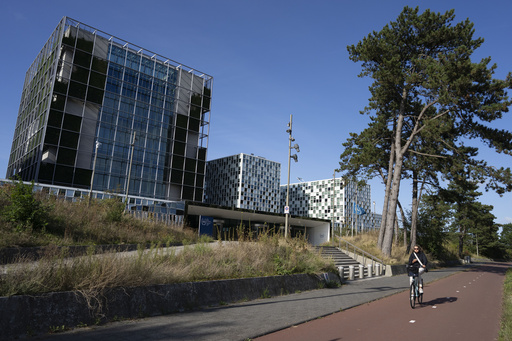THE HAGUE, Netherlands — An executive order signed by U.S. President Donald Trump imposing sanctions on the International Criminal Court (ICC) could potentially disrupt the court’s ongoing investigations and trials related to war crimes and genocide. The order, executed on Thursday, claims that the ICC is engaging in “illegitimate and baseless actions” targeting the United States and its ally, Israel. This stance comes after the ICC issued an arrest warrant last year for Israeli Prime Minister Benjamin Netanyahu and his former defense minister, Yoav Gallant, in connection to alleged war crimes in Gaza.
In response to the sanctions, the Hague-based ICC expressed strong disapproval, stating, “The Court stands firmly by its personnel and pledges to continue providing justice and hope to millions of innocent victims of atrocities across the world,” highlighting its commitment to its mission amid external pressures.
Established in 2002, the ICC serves as a permanent global tribunal designed to handle the most serious international crimes, including war crimes, crimes against humanity, genocide, and aggression. While the U.S. and Israel are not signatories to the court’s foundational treaty, the Rome Statute, a total of 125 countries have joined. The ICC intervenes in situations where nations are unwilling or unable to carry out prosecutions for crimes occurring within their jurisdictions. Ukraine became the latest member to join the court officially in January.
To date, judges at the ICC have convicted 11 individuals. The first conviction was that of Congolese warlord Thomas Lubanga in 2012, who was sentenced to 14 years for recruiting child soldiers. Another notable case involved Bosco Ntaganda, a Congolese warlord dubbed “The Terminator,” who received a 30-year sentence in July 2019 for war crimes committed during a violent ethnic conflict in Congo between 2002 and 2003. In 2021, Dominic Ongwen was found guilty of numerous war crimes, including forced marriages and killings, stemming from his past as a child soldier and subsequent rise as a leader of the Lord’s Resistance Army in Uganda.
The ramifications of Trump’s sanctions remain uncertain. The executive order utilizes various emergency powers to facilitate the imposition of specific sanctions by the U.S. Treasury and State Departments. Chief Prosecutor Karim Khan of the ICC is likely to be a primary target, along with others involved in the Netanyahu investigation, notably the judges who authorized the arrest warrants. The sanctions could severely hinder the court’s operational capabilities, potentially bringing its functions to a standstill.
During his previous term, Trump had already imposed sanctions on former prosecutor Fatou Bensouda and one of her deputies due to her inquiry into alleged war crimes in Afghanistan, which explored actions by the Taliban, U.S. military personnel, and intelligence operatives dating back to 2002. Those sanctions had barred Bensouda and her immediate family from entering the United States and prevented access to U.S.-based assets held by court employees. These sanctions were lifted by President Joe Biden upon his inauguration in 2021.
As for the arrest warrants issued for Netanyahu and others, a pretrial panel released these warrants in November, accusing them of war crimes and crimes against humanity linked to the ongoing conflict in Gaza. The warrants noted that both Netanyahu and Gallant allegedly utilized “starvation as a method of warfare” by limiting humanitarian aid and intentionally targeting civilians during military operations against Hamas. Israeli officials dispute these allegations, asserting their innocence.
This unprecedented move marked the first instance in which a sitting leader of a significant Western power has faced accusations of war crimes from a global judiciary, placing Netanyahu and others on international wanted lists and exposing them to the risk of arrest during foreign travel, which could contribute to their further diplomatic isolation.
Currently, the ICC faces a rare situation where it has no ongoing trials for the first time since it began arresting suspects in 2006. The court has released 33 unsealed arrest warrants which include high-profile figures such as Netanyahu, Russian President Vladimir Putin, Ugandan rebel leader Joseph Kony, and Gamlet Guchmazov, a former member of the South Ossetian government in Georgia. Kony is wanted for war crimes and crimes against humanity, whereas Guchmazov faces torture charges. Presently, there are three verdicts pending, involving individuals such as Patrice-Edouard Ngaïssona and Alfred Yekatom, who are charged with numerous war crimes related to their leadership roles in a Christian rebel group in the Central African Republic.
Last year, a trial against Ali Mohammed Ali Abdul Rahman Ali, alleged leader of the Janjaweed militia in Sudan, was concluded. In an unexpected twist, there was a brief moment last month when the ICC appeared ready to apprehend Libyan warlord Ossama Anjiem, only for Italian authorities to send him back home instead. Anjiem is known to oversee a controversial network of detention centers operated by the government-backed Special Defense Force in Tripoli.



